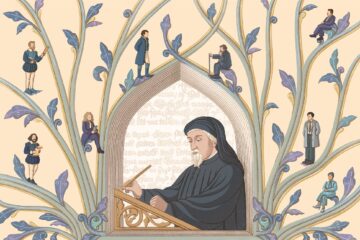Camille Ralphs at The Poetry Foundation:
 Who else could have imagined such a motley ensemble but someone who had jostled with the many flavors of humanity? The medleyed voices of the Miller, who can break down doors by running at them with his head; the “gat-toothed,” half-deaf Wife of Bath, who rides astride in bright red stockings; the Canon alchemist, so sweaty from the ride that his horse is a lather of suds; the “ful vicious” Pardoner with his jar of dubious holy “pigges bones”; and the garlic-loving Summoner, with a face so pimply “children were aferd”—Chaucer knew them all. As Mary Flannery argues in her authoritative and diverting monograph Geoffrey Chaucer: Unveiling the Merry Bard (Reaktion Books, 2024), the mercenary assets of “The Shipman’s Tale,” in which a merchant’s wife offloads a difficult financial situation by insisting she’ll repay her husband with sex (“By God, I wol nat paye yow but abedde!”) must come from Chaucer’s roving through “warehouses, docks and markets.” Works such as The Book of the Duchess (1368)—probably penned on the death of Blanche of Lancaster, the wife of John of Gaunt (it also circulated under the title “The Deth of Blaunche”)—could only be written by a man who’d worked in “palaces and great houses in England and on the Continent.”
Who else could have imagined such a motley ensemble but someone who had jostled with the many flavors of humanity? The medleyed voices of the Miller, who can break down doors by running at them with his head; the “gat-toothed,” half-deaf Wife of Bath, who rides astride in bright red stockings; the Canon alchemist, so sweaty from the ride that his horse is a lather of suds; the “ful vicious” Pardoner with his jar of dubious holy “pigges bones”; and the garlic-loving Summoner, with a face so pimply “children were aferd”—Chaucer knew them all. As Mary Flannery argues in her authoritative and diverting monograph Geoffrey Chaucer: Unveiling the Merry Bard (Reaktion Books, 2024), the mercenary assets of “The Shipman’s Tale,” in which a merchant’s wife offloads a difficult financial situation by insisting she’ll repay her husband with sex (“By God, I wol nat paye yow but abedde!”) must come from Chaucer’s roving through “warehouses, docks and markets.” Works such as The Book of the Duchess (1368)—probably penned on the death of Blanche of Lancaster, the wife of John of Gaunt (it also circulated under the title “The Deth of Blaunche”)—could only be written by a man who’d worked in “palaces and great houses in England and on the Continent.”
More here.
Enjoying the content on 3QD? Help keep us going by donating now.
